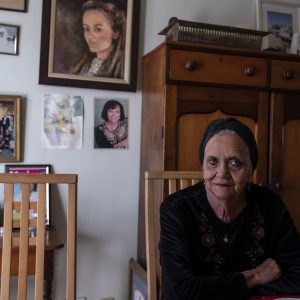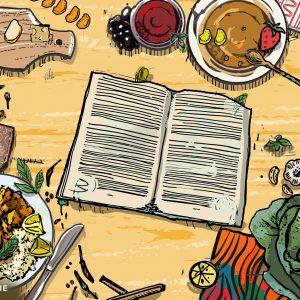Dorah Sitole’s long love affair with food
The cordon bleu chef, author, editor and food influencer has guided food culture in South Africa. Her new book reflects on 40 years of cooking, telling the story of her life through food.
Author:
4 November 2020

It has been 40 years since Dorah Sitole walked into Canned Food Advisory Service, the marketing division of a container and packaging company called Metal Box, to interview for the position of cooking demonstrator. Her husband told her about the job opening, saying, “I don’t know anyone who cooks better than you.” That moment would launch her groundbreaking career in food and Sitole’s new book is a reflection on this long career that has shaped the path of South African food culture.
“It’s 40 years of my professional career,” says Mam’ D, as Dorah Sitole is affectionately known, a week after the book appeared on bookstore shelves. The doyenne of food in South Africa says that before the successful job interview in February 1980, she was simply an enthusiastic cook who enjoyed feeding her friends and family.
Related article:
“When I walked into that office, I didn’t think I was going to get the job because I had never done home economics at school and I didn’t know that there was a career in food. But I was a good cook that liked trying out recipes and attending cooking demonstrations.
“At the time of the interview, I was a coding clerk for a market research company, which I had been doing for seven years. So I was pushing a lot of papers at my desk, which wasn’t terrible work but I think I found it boring. So I took my notebook, which had all my recipes and was covered in oil because it was very well-used, and I nervously showed up for the interview. I was told that me being able to cook was enough and got the job.”
Sitole was hired to host cooking classes and demonstrations for high school students and mainly Black women looking to improve their cooking using canned food. “About a month or two into doing the demonstrations, I realised that I loved it,” she recalls. She continued adding to her skills and qualifications, completing a baking and a chef’s course, and obtaining a diploma in public relations. “I just realised that that’s where I was headed and those were the skills I thought I needed.”
-

Undated: Dorah Sithole’s beef tagine, traditionally a dish from North Africa. (Photograph supplied)
Elevating household food
Part of Sitole’s immense influence has resided in her ability to take food and meals enjoyed by working and middle-class Black households, and elevate and celebrate it by showcasing it on the various platforms available to her. For many Black people, it was an affirmation that what we loved and/or what we could afford to eat was worthy of showcasing, too. That it was good, just like the cuisines and meals of other countries and communities that are elevated in food culture.
This was particularly important during apartheid and the early days of democracy, when Black people weren’t considered a community worthy of being catered for. “When people spoke of South African food, it was never really food eaten in Black or township homes. We would hear about bobotie, melktert and koeksisters, but there was never any morogo or amabele,” she says, referring to the curried mince dish, milk tart and sugary plaits that were given preference over wild spinach and sorghum.

“So I think my greatest impact was during my years at True Love, where I was able to work with brands such as Tastic, Rainbow Chicken, Snowflake and Woolworths who for many years didn’t really speak to Black people.”
In many ways, Sitole was the original food influencer. It is an industry that has grown in leaps and bounds since she started doing twice-a-week demo classes as True Love magazine’s food editor.
A life story in food
Her new book, the third book for the acclaimed author, tells the story of her life through food.
“When I was growing up, we were always hungry. There was just no food. I also don’t know if I was just born with a genetic love for food, but I really love food. I look at my grandchildren and they can eat whatever they want, whereas I never had that for the first two decades of my life. Even after I finished school and left Nigel, where my grandparents lived, to move to Dube in Soweto with my mother, there was still no food,” she says.
“In Nigel, we were really just scraping, aside from a small vegetable patch that my aunt had, which meant we could have spinach in the summer. In Dube, while we could buy bread and milk, my mother was still the sole provider and so she didn’t have much money. So what money there was had to stretch, and that’s why on Tuesday, Wednesday and Thursday we would have pap and the mixed legume stew that’s in my book. We didn’t have plenty of food, but there was something to eat. So when I started earning my own money, I started working at round 18, I began experimenting with different recipes and I started cooking more, which made me fall in love with food because finally I could eat whatever I wanted.”
-

Undated: Freshly prepared coleslaw from Dorah Sithole: 40 Years of Iconic Food. -

Undated: Passion fruit crème brulee by Dorah Sithole.(Photograph supplied)
Sitole’s love for food took her all over the country and the world, but she still wants to see more of Africa. “When I was writing both Cooking From Cape to Cairo books, I was lucky in that I got to visit about 19 African countries, but there is still so much of the continent I want to see. God willing, I want to do a third Cooking From Cape to Cairo and visit Central Africa, more of West Africa, Namibia, Cameroon…”
One of Sitole’s favourites from her years of travel and developing recipes is an East African fish dish, which she says is one of the recipes she would call her signature dish, along with her seafood samp. “The seafood samp is a recipe I learnt from a chef at Phinda Lodge [in KwaZulu-Natal], which I have perfected over the years. It’s basically a samp paella. I enjoy cooking with seafood because I think South Africa has such a rich seafood cuisine culture and history. We don’t talk enough about our love for seafood.”
A profound influence on Black chefs
Sitole says her new book was born out of wanting to share how she used her love of food to create an illustrious career. “I thought I should talk about my life, how I got into food and what’s happened to me over the years. Especially for younger chefs, who ask how I built my career.”
Sitole’s career has inspired many, including award-winning chef and The Lazy Makoti founder Mogau Seshoene.
“My earliest memory of Mama Dorah was as a little girl growing up in Limpopo in the 1990s. Both my mom and aunt had a True Love subscription, a magazine she was food editor of and later editor-at-large for many years. I was always tasked with neatly cutting out her recipes or copying them into an exercise book that would serve as a trusted recipe book, some of which my mother made so many times that she began to know them off by heart. Her monthly recipes were the reason the magazine was a staple in our household,” says Seshoene.
Related article:
Later in life, once her own food journey had begun, Seshoene got the opportunity to meet Sitole. “I met her at a cooking workshop at a mall and I asked to shadow her. She invited me to her house and we cooked together. What a surreal experience, to cook with this lady I grew up idolising. We then worked together on a big campaign for Koo beans. And she was someone I could call on when I needed to.
“Of course, when the time came for me to author a cookbook, I knew I wanted her to write the foreword. Not only did she agree, but she was my conversationalist for my book launch. I cried many tears of joy that night. By the time the night was over, I had had my book launch hosted by my hero and inspiration. I consider Mama Dorah to be instrumental to my even being here, to my even having considered a career in food. She truly paved the way for me and many others.”

A food revolution
Sitole remains as optimistic and excited as ever about food, South African food in particular. “I think we are really on the cusp of an African food revolution,” she says boldly. “I look at my grandson and he loves sushi and I often wonder whether children in Tokyo eat South African food, but we are slowly getting there. We are embracing our food as a country and as a continent and that’s a big part of the revolution. There are young chefs such as Lesego Semenya who are a part of celebrating our local foods, so I’m excited.”
Sitole, in a full-circle moment, says that in addition to wanting to keep cooking, she wants to open a cooking school. Ever the teacher, Sitole says, “I really want to get my cooking school going. It wouldn’t be a professional school because I think there are enough of those, but I want to do cooking lessons for anyone who wants to improve their cooking in a comfortable setting. I already started in 2019 with some classes in Fourways in the north of Johannesburg and I really want to take that forward.”



